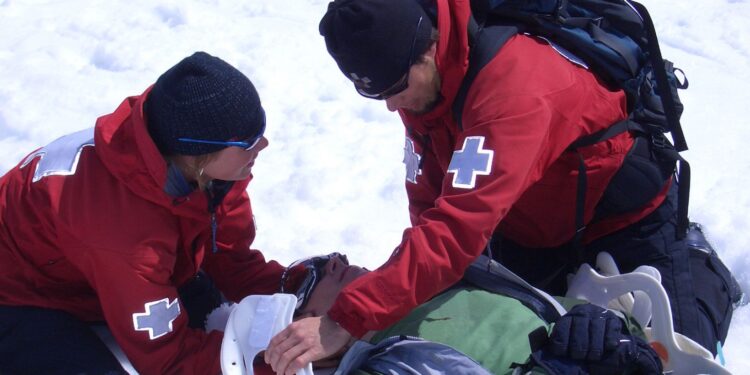Participating in sports, especially contact sports like rugby, can be exhilarating and rewarding. The adrenaline rush that comes from competing on the field, the camaraderie shared among teammates, and the thrill of victory all contribute to the unique appeal of these activities.
However, the nature of these sports also carries a certain level of risk, as injuries and accidents can happen unexpectedly, potentially affecting the well-being of athletes and sports enthusiasts alike.
When engaging in sports, especially high-impact and physically demanding ones such as rugby, it is essential to prioritize safety and be prepared for any unforeseen circumstances. This is where first aid knowledge plays a critical role. First aid skills empower individuals to take immediate action and provide the necessary care in the crucial moments following an injury, potentially preventing further harm and expediting the recovery process.
In the context of sports, first aid knowledge becomes even more significant, especially in a sport as dynamic and contact-intensive as rugby. Whether you are a player pushing your physical limits, a coach responsible for guiding and protecting your team, or a passionate spectator cheering from the sidelines, having a solid understanding of first aid can make a significant difference in effectively managing injuries and ensuring the well-being of everyone involved.
For players, the fast-paced and physically demanding nature of rugby exposes them to a wide range of potential injuries. From sprained ankles and dislocated joints to concussions and fractures, the risks are inherent. By equipping themselves with first aid skills, players can swiftly assess and respond to injuries, implementing appropriate measures to minimize the impact and prevent further complications. They can also provide immediate care to their teammates, fostering a culture of support and safety within the team.
Coaches, on the other hand, play a pivotal role in guiding and nurturing their athletes. Beyond strategy and skill development, coaches must also prioritize the health and well-being of their team members. With comprehensive first-aid knowledge, coaches can respond promptly in critical situations, ensuring that injured players receive timely and appropriate care. By demonstrating a commitment to safety and taking a proactive approach to injury management, coaches can instill confidence in their athletes and create an environment conducive to both personal growth and collective success.
Even as a spectator, being knowledgeable in first aid can be immensely valuable. Accidents can happen on the field, and having a basic understanding of first aid allows spectators to provide immediate assistance while waiting for professional medical help to arrive. Whether it’s administering basic wound care, stabilizing injuries, or recognizing signs of a more serious condition, the ability to offer immediate aid can make a significant difference in the outcome and overall well-being of the injured individual.
The Significance of First Aid in Sports:
Sports-related injuries can range from minor cuts and bruises to more severe conditions such as sprains, fractures, and concussions. Quick and appropriate CPR and first aid training in Calgary can significantly reduce the severity of an injury, promote faster recovery, and even save lives.

By having individuals trained in first aid present at sporting events and practices, the overall safety and well-being of everyone involved can be enhanced.
Common Sports Injuries in Rugby:
Rugby is a physically demanding sport that involves high impact and collisions. Understanding the types of injuries commonly seen in rugby can help in being prepared to address them. Some common injuries include:
Sprains and Strains: Ligament sprains and muscle strains are frequent occurrences in rugby, often resulting from sudden twists, turns, or tackles. Proper first aid techniques, such as RICE (rest, ice, compression, elevation), can be applied to manage these injuries effectively.
Fractures and Dislocations: Rugby involves intense physical contact, which increases the risk of fractures and joint dislocations. Immediate immobilization of the affected area and seeking professional medical assistance are crucial steps in managing these injuries.
Head Injuries: Concussions and other head traumas are serious concerns in rugby. Recognizing the signs and symptoms of a concussion and ensuring the injured individual receives appropriate medical attention is vital to prevent further complications.
Essential First Aid Skills for Sports Enthusiasts:
Whether you’re a player, coach, or spectator, acquiring basic first-aid skills can contribute to a safer sports environment. Some fundamental skills to focus on include:
CPR and AED: Knowing cardiopulmonary resuscitation (CPR) and how to use an automated external defibrillator (AED) can be life-saving in cases of cardiac arrest. These skills are especially critical for coaches, officials, and anyone responsible for the well-being of athletes.
Wound Management: Learning how to clean, dress, and bandage wounds properly can help prevent infection and facilitate healing. This skill is particularly useful for players, as cuts and abrasions are common in sports.

Immobilization Techniques: Understanding how to stabilize fractures, dislocations, and spinal injuries until professional medical help can minimize further damage. Coaches and team staff should be familiar with these techniques.
Concussion Management: Recognising the signs of a concussion and knowing how to respond appropriately is essential for all individuals involved in sports. This includes understanding the importance of removing the injured player from the game and ensuring they receive proper medical evaluation.
First Aid Training and Certification:
To acquire comprehensive knowledge and practical skills in first aid, it is recommended to attend certified first aid training courses. These courses provide hands-on practice, scenario-based learning, and valuable insights into managing sports-related injuries. Obtaining a recognized certification not only builds confidence but also ensures you are equipped to respond effectively during emergencies.
The Takeaway
In the fast-paced world of sports, having a solid understanding of first aid skills is indispensable. Whether you’re actively participating in rugby or cheering from the sidelines, being prepared for potential injuries and emergencies can make a significant difference. By acquiring essential first aid skills and staying up-to-date with the latest techniques, you contribute to a safer sports environment, protecting the well-being of athletes and sports enthusiasts alike.







